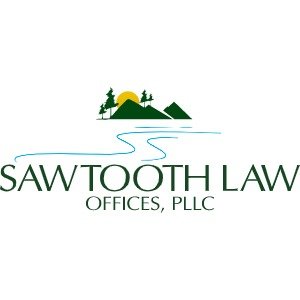Best Sanctions & Export Controls Lawyers in Twin Falls
Share your needs with us, get contacted by law firms.
Free. Takes 2 min.
List of the best lawyers in Twin Falls, United States
About Sanctions & Export Controls Law in Twin Falls, United States
Sanctions and export controls are essential legal areas designed to regulate the movement of goods, technology, services, and financial resources across borders. In Twin Falls, United States, these laws primarily draw from federal regulations but may also involve state and local aspects. Sanctions generally refer to government-imposed restrictions aimed at specific countries, individuals, or entities for economic or foreign policy reasons. Export controls involve various regulations that limit or monitor the transfer of certain items, software, or technology to foreign countries to protect national security, foreign policy interests, or economic stability.
For individuals and businesses in Twin Falls, understanding and complying with these regulations is crucial since violations can result in severe penalties, substantial fines, and even criminal prosecution. Sanctions and export controls can affect a wide array of industries, including agriculture, manufacturing, technology, and financial services.
Why You May Need a Lawyer
Navigating sanctions and export controls can be complex due to overlapping federal, state, and international regulations. Common situations where you may require legal help include:
- Exporting goods or technology internationally from Twin Falls
- Dealing with foreign customers, suppliers, or business partners
- Facing a government investigation or enforcement action related to sanctions or export violations
- Receiving inquiries from the US Department of Commerce, Treasury, or State regarding your business activities
- Developing compliance programs for your organization
- Seeking guidance on embargoed or restricted countries, entities, or products
- Conducting due diligence on international transactions
- Applying for export licenses or permits
A qualified lawyer can assist in interpreting federal sanctions lists, reviewing compliance requirements, responding to government inquiries, and representing you during enforcement proceedings.
Local Laws Overview
While the primary authority over sanctions and export controls in Twin Falls comes from federal law, there are local considerations to keep in mind. Key aspects include:
- Federal Agencies: The US Department of Treasury's Office of Foreign Assets Control (OFAC), the Bureau of Industry and Security (BIS) in the Department of Commerce, and the Directorate of Defense Trade Controls (DDTC) in the Department of State oversee most regulations.
- Idaho State Law: Idaho may have additional registration, reporting, and licensing requirements for businesses involved in international trade, especially for agricultural or controlled commodities commonly exported from the region.
- Local Enforcement: Twin Falls authorities may cooperate with federal agencies in the enforcement of sanctions and export laws, especially when violations occur within city or county limits.
- Industry Impact: Twin Falls businesses in food processing, manufacturing, and technology should pay particular attention to export classification and trading partner restrictions.
Remaining current with these legal requirements is essential for anyone involved in cross-border transactions or global trade in the Twin Falls area.
Frequently Asked Questions
What are sanctions and how do they apply in Twin Falls?
Sanctions are legal restrictions imposed by the US government against certain countries, individuals, or entities. These sanctions apply nationwide, including in Twin Falls, and restrict trade, investment, and financial transactions with specified targets.
Which agencies enforce export controls in Twin Falls?
The key agencies are the US Department of Commerce (BIS), the Department of State (DDTC), and the Department of Treasury (OFAC). Local authorities may assist in enforcement efforts as needed.
What types of goods are subject to export controls?
Goods subject to export controls include high-tech equipment, software, military items, dual-use products, agricultural commodities, and certain chemicals. The level of control depends on the item's classification and the destination country.
Are there local regulations in Twin Falls that affect export controls?
Most export control laws are federal, but Twin Falls businesses may be subject to additional local registration or compliance requirements, especially for specific industries like agriculture and manufacturing.
What happens if I violate a sanctions or export law?
Violations can result in significant fines, loss of export privileges, criminal prosecution, reputational harm, and the seizure of goods. Immediate legal advice is recommended if you suspect a violation.
How can I find out if a person or entity is on a sanctions list?
The OFAC and BIS maintain searchable lists online. Legal professionals can help you interpret these lists and ensure compliance with the latest updates.
Do I need a license to export goods from Twin Falls?
Some exports require licenses from federal agencies, depending on the classification of the goods, their intended use, and the destination country. A lawyer can guide you through the application process.
Can local businesses be affected by international sanctions even if they do not export directly?
Yes. Sanctions can affect transactions with foreign customers, suppliers, banks, or other business partners. Even indirect dealings may trigger compliance obligations.
What steps can I take to ensure compliance with export controls?
Implement a robust compliance program, conduct regular screening of customers and partners, maintain up-to-date training, and seek specialized legal advice as needed.
Where can I turn for help if I have questions about sanctions or export controls?
Legal professionals, industry associations, and government agency contact centers are key resources. See below for more specific recommendations.
Additional Resources
If you need further information or assistance with sanctions and export controls, consider contacting the following resources:
- Office of Foreign Assets Control (OFAC): US Department of Treasury resource for sanctions regulations and compliance guidance
- Bureau of Industry and Security (BIS): US Department of Commerce authority for export administration regulations
- Directorate of Defense Trade Controls (DDTC): US Department of State oversight for defense exports and arms regulations
- Idaho Department of Commerce: Offers export assistance and business guidance for Idaho-based companies
- Twin Falls Chamber of Commerce: Can connect local businesses with export control experts and compliance training programs
- Local law firms specializing in international trade law: Provide legal services and compliance support for Twin Falls residents and businesses
- Export.gov: Offers federal guidance and tools for exporters nationwide, including Idaho
Next Steps
If you are facing a sanctions or export control issue in Twin Falls, start by gathering relevant documentation, such as contracts, correspondence, product information, and any government communications. Consult a lawyer specializing in sanctions and export controls to evaluate your situation and outline your compliance obligations or defense strategy. Many legal professionals offer initial consultations to assess your needs and guide you through the necessary steps, including responding to inquiries, applying for export licenses, or developing a compliance program. Staying proactive in seeking legal advice and staying informed about current regulations is the best way to avoid penalties and safeguard your interests.
Lawzana helps you find the best lawyers and law firms in Twin Falls through a curated and pre-screened list of qualified legal professionals. Our platform offers rankings and detailed profiles of attorneys and law firms, allowing you to compare based on practice areas, including Sanctions & Export Controls, experience, and client feedback.
Each profile includes a description of the firm's areas of practice, client reviews, team members and partners, year of establishment, spoken languages, office locations, contact information, social media presence, and any published articles or resources. Most firms on our platform speak English and are experienced in both local and international legal matters.
Get a quote from top-rated law firms in Twin Falls, United States — quickly, securely, and without unnecessary hassle.
Disclaimer:
The information provided on this page is for general informational purposes only and does not constitute legal advice. While we strive to ensure the accuracy and relevance of the content, legal information may change over time, and interpretations of the law can vary. You should always consult with a qualified legal professional for advice specific to your situation.
We disclaim all liability for actions taken or not taken based on the content of this page. If you believe any information is incorrect or outdated, please contact us, and we will review and update it where appropriate.









